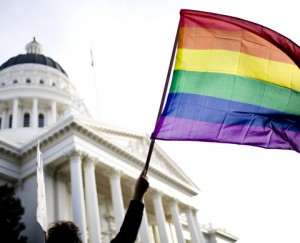California Bans Gay and Transgender Panic Defense
Beginning in 2015, California will no longer permit this “gay panic” as a defense in a court of law.
 What’s gay panic? Imagine a situation where a guy wakes up from a night of drunken debauchery and finds that his night’s lover is actually a man, despite the pink skirt and blonde hair. In a fit of rage, the guy strangles his former partner to death.
What’s gay panic? Imagine a situation where a guy wakes up from a night of drunken debauchery and finds that his night’s lover is actually a man, despite the pink skirt and blonde hair. In a fit of rage, the guy strangles his former partner to death.
Shockingly, the murderer might be able to reduce his sentence by claiming that he temporarily went insane after the same-sex encounter–just not in California any longer.
The “gay panic” defense is a legal defense typically invoked in an assault or murder case. The defense has two parts: First, the defendant was the object of a homosexual or transgender sexual advance and second, the defendant went temporarily insane due to the encounter and violently reacted to the sexual advance. Gay panic has been invoked in a few famous murder cases, including the murder of Matthew Shepard.
A Necessary Reform
California’s new ban doesn’t appear to be very controversial, since most reasonable people will agree that flirting, including homosexual flirting, does not justify a murder. However, many states still uphold the gay panic defense.
I’ll go over some of the weaknesses the gay panic defense has and by exploring those weaknesses, we can better understand why this legal “defense” should go the way of the dodo.
First, gay panic only works if the defendant was on the receiving end of a homosexual advance. Since there is no heterosexual or even asexual panic defense, gay panic is condemned by the LGBT community as a discriminatory doctrine that devalues the lives of homosexual and transgender people. Equality between people of different sexual orientations demands that the gay panic defense be removed.
In one case, Joseph Parson, prosecutors sought to overcome a defendant’s gay panic defense by proving that the victim wasn’t gay or even bisexual. A victim’s sexual preferences should not be an excuse for how a defendant behaves. It is the defendant who is on trial, not the victim. Deciding whether a victim was gay or not amounts to victim blaming and the legal system has been working to remove that from rape cases as well. Society doesn’t judge whether a rape is wrong based on what gender a victim prefers to sleep with, and we shouldn’t be doing it with murder either.
Many people mistakenly believe gay panic is self-defense, but gay panic is in fact a type of temporarily insanity or diminished capacity plea. A defendant who pleads self-defense fully intended and was fully aware of killing the victim, but the defendant claims that the circumstance justified the killing. In contrast, a gay panic defense argues that the defendant lacked the criminal intent necessary for a murder conviction because the defendant was so freaked out by the sexual advance that the defendant lost his (or her) mind. Again, the gay panic defense casts the victim as the villain and the defendant as being unresponsible for the killing. If a person is so traumatized by sleeping with another person of the same gender, then the defendant should go see a therapist rather than take a life.


Comments